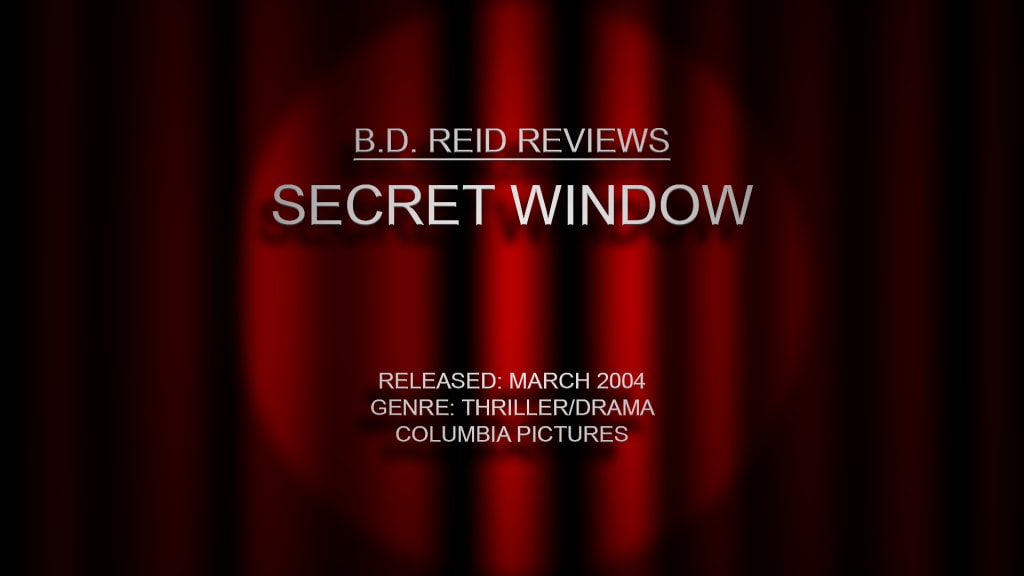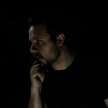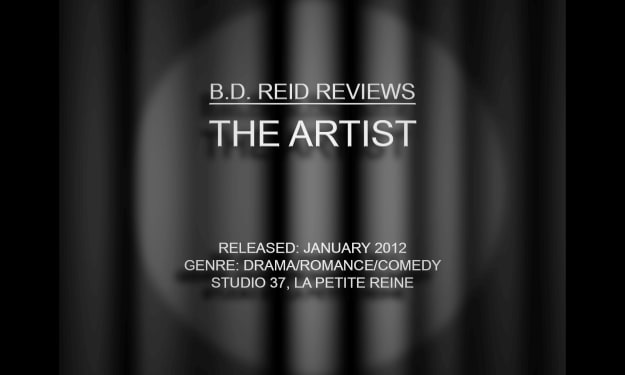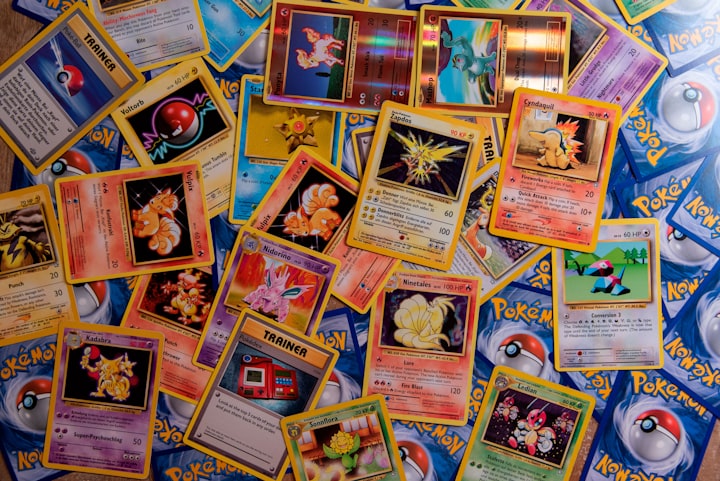
This film was one of my high-school favourites, having seen it for the first time in early 2006. I love Johnny Depp, I love mystery about killers, and I think (even though I hadn’t quite realized it yet) I also found the lead character very relatable because he was a writer and I was a writer. Unfortunately, I haven’t seen this movie for close to a decade. While delving more into the film world and becoming a screenwriter and film critic, I heard a few other critics say that they don’t like this movie, particularly the ending, which I found odd considering I had read the novella and preferred the film’s ending to it. Having been so in love with it since High School, but having come so far as an artist since then, I wanted to re-visit this film and see if it held up since the time I had last seen it.
This is mainly because I had no earthly understanding of why it was so hated: 46% on Rotten Tomatoes, 6.6 on IMDb, and a staggeringly low 2/5 on Metacritic. And having seen it again… I still don’t get it. Sure, I will own up to a few faults, which I’ll discuss more in detail throughout this review, but the majority of the film still really holds up. So, if you hate this film, please bear with me as I try to defend it, though I probably won’t change your mind.
Secret Window follows a writer named Morton Rainey (played by Johnny Depp) who is going through depression during a bitter divorce from his wife, Amy (played by Mario Bello), who has moved on with her lover, Ted (played by Timothy Hutton). Morton has moved out to his lake-side house, where he spends most of his days sleeping on the couch and struggling to overcome his writer’s block. Enter John Shooter (played by John Turturro – my, a lot of “Johns” relating to this movie) a farmer from Mississippi, claiming that Morton “stole his story” and threatening him to “fix the ending.” Throughout the film, Morton’s ennui and bitterness prevents him from dealing with his problems, which causes Shooter to become physically abusive, to the point of murdering his friends (and dog) and burning down his former house (where he had shared his life with Amy). By the end, Morton has become deranged enough that the truth (SPOILERS) is revealed to him: John Shooter is nothing more than a figment of his imagination manifesting from the trauma of his failed marriage, resulting in Dissociative Identity Disorder or Schizophrenia (psychologists can correct me). Under the guise of Shooter, Morton takes his revenge by killing Amy and Ted and burying them in the garden outside his lake house. Afterwards, Morton becomes more friendly, gets his physical problems taken care of, and over-comes his writer’s block. The film is based on the novella "Secret Window, Secret Garden," written by the great Stephen King, and was directed and adapted by David Koepp, who usually worked more as a screenwriter, penning such films as Jurassic Park, Panic Room, and the Sam Raimi Spider-man trilogy.
And I gotta say, having read the novella multiple times in high school, it’s a great and very faithful adaptation. Most of the dialogue is lifted straight from the original, and most of the plot points follow the same linear trajectory. There are a few changes here and there from the book, such as changing Mort’s cat to a dog, the names of Mort and Shooter’s are swapped in the film, and the ending. Personally, as I previously stated, I preferred the ending of the film to the book. I did see the movie first, so there’s probably a part of me that refused to accept the second version I was presented. I feel like this point is mostly undone by the idea that there are plenty of films where I prefer the alternate ending or the original ending, or simply by the fact that I’ve been a fan of “How It Should Have Ended” since around the time I first saw this film. But my real reason, and I’m so glad that I can properly articulate this, is related to the story.
See, in the novella, Amy gets up to the lake house, meets Morton, discovers that he’s insane and calling himself “Shooter” and then Morton gets gunned down by a random cop. Yeah, not even Dave Newsome, it’s just some random guy who shows up, isn’t established, and offs the lead character that we’ve been spending the book getting to know. The film ends with Morton embracing his craziness, getting his revenge, and getting his life back on track.
While, yes, I can say that I don’t agree with making a protagonist that we’re supposed to like a dog and wife killing alcoholic, both the novella and the film do write an empathetic character in Morton. We’ve all been in or been around relationships where someone was mistreated, meaning that we can all relate to the emptiness that Morton is feeling throughout the story as well as the desire for revenge, and the pain of trying to let go of a life that you want to hold onto. In this way, given how short the novella was, I think the film adaptation made the story stronger because it changed the ending to something more… well… evil. The movie allows us to sympathize with Morton because we understand the pain he’s going through. We understand the fear that he must have due to Shooter, because we’ve all been bullied in some form or another and can relate to it. We understand how unfair his world is and we want to see him better himself. The twist of the story, and the true magic of Stephen King is that he gets us to root for the bad guy but not tell us.
And just like The Sixth Sense, the film does give us plenty of clues as to what’s going on. One of the things I noticed back in high school, upon repeat viewings in that during the second scene in the film (where Shooter first appears), Morton shouts at his dog, Chico (poor Chico), and the dog looks at Shooter, not at Morton. Our lead is set up as a writer and, as any writer will tell you, he draws on real life to create characters, stories, and worlds. Hence, in the final twist, his conscience is telling him about things like “pilgrim” and “Shooter’s Bay,” so, we can go back and see these clues point us in the right direction. Other little hints come from other characters, like the cleaning lady mistaking Shooter’s script for Morton and mentioning pseudonyms or the clerk at the store asking him if he wants some Pall Mall cigarettes (Shooter’s brand) when we see early on that Morton smokes L&M. A good twist is one that works within the confines of and enhances the story, which this film does. Bad twists are one that come out of nowhere, and I feel like a lot of the hatred that this film gets may stem from the idea that the twist makes no sense. Personally, I think it makes all the sense in the world: a dramatic writer has his perfect life torn from him and he snaps, but doesn’t want to do anything about it, so invents a way to get it done.
And Johnny Depp plays this character to absolute perfection… right up until the Third Act. If you were to tell me that your problem with this movie came from the ending, despite my love for how it’s written, how it’s acted is another story entirely, and I would completely believe you. Johnny Depp has played some wonderfully kooky characters with half decent accents (Sweeney Todd, Jack Sparrow, Detective Abberline), but upon my latest viewing, I saw just how hokey his “Miss’ippi” accent was and it kinda took away from the terror I’m supposed to feel. Very much like Jim Carrey in The Truman Show or Yes Man, the parts of this movie where Depp shines are the parts where he’s just playing a normal guy with a normal problem and giving very normal reactions to them. He’s not as over the top this time, which helps sell the believability of Morton’s character. And, as added bonus, because he’s not so over-the-top, like he’s become today, Johnny is able to blend more with the character. That is, again, until the final act.
You know who else is toned down? Turturro. That’s a shocker right there, given that he has some of the most pronounced moments of over-acting in the whole film. But since I first saw this film, I’ve also seen Turturro in films like Transformers, Barton Fink, and You Don’t Mess With the Zohan, where he plays just as zany character as Depp does, if not more zany… no, no… just “as” zany. So, watching this again shows that he can turn in a legitimately terrifying performance. I also like that his motivation gives away more than we think it does at first. He wants Morton to “fix the ending.” This line is probably my favourite in the whole film, because he’s not just referring to the ending of his story… he’s referring to the ending of Morton’s story. He’s born out of Morton’s desire to “Shoot Her” (referring to Amy), and his goal is a subtle nod, on repeat viewings, to Morton wanting to re-write his life. As per my previous statements on the ending RE: Book vs. Film, I also think that this line refers to changing the ending from the source material.
The other characters are kind of where I see why people might not like this film. Amy and Ted are given enough backstory so you understand why they want what they want, but I don’t really like their acting. In Hutton’s case, this was deliberate choice, too. Hutton was apparently cast in the role because Koepp thought that he was capable of creating this presence of “unlikeable.” Ted never really gets much development and spends most of his time on-screen just being “the other guy.” Mario Bello is okay for what was asked of her, but for being someone so influential in Morton’s ennui and the focal point of Shooter’s revenge, she’s strangely absent from the film. She cheated on her husband, sure. But she doesn’t make enough of an impact on the audience and certainly not a negative enough one to justify her gruesome fate.
The PI is probably the only other character in the film that I enjoyed watching, mostly because he actually wants what’s best for Morton. Despite him being a hired gun, he creates this odd friendship with our lead and I was truly sad to see him go.
The other fundamental aspects of the film are sturdy. The colours don’t pop off the screen, but they aren’t muted which, for this more realistic story, fits the tone of the film. The cinematography is very clever in some spots, like starting out the film going into the mirror and entering the climax by exiting the mirror, visually showing how we’re seeing the world from Morton’s point of view, not reality. The opening shot shows Morton, frowning, covered in darkness and snow, while the ending is in the middle of summer, bright, with Morton smiling. I find that the editing is not distracting, mostly because the film does tend to have a great deal of shots that last more than one second. During the climax, the reveal is done mostly in one shot, which allows us, as well as Morton to slowly allow reality to sink in. Koepp talks about many of these choices in the Special Features of the DVD, so I’d check that out for more details.
Watching this film after so long and learning so much does change how I view some elements of the film. The story focuses more on Depp’s character, so there is a lot more time devoted to seeing him and his struggle. It can be difficult to focus on one character alone for so long without the others coming in to crowd the story or without those same character coming across as flat and uninteresting. But I think that Depp’s skill and Turturro’s craziness do keep me engaged for the most part. The final twist of the film isn’t really that unique, but it does come from a very realistic place and was more along the lines of what I had hoped Hereditary would’ve been. I like the technical aspects of the film and the narrative and I think this is a very largely under-appreciated film.
Overall, the hatred this film gets does make more sense to me now than it ever did, but I still feel like it’s largely unwarranted. I relate to the anger and the pain that our lead character goes through, and I appreciate the catharsis of his revenge, even if I don’t agree with it. And the biggest thing about this film for me is it’s apparent lack of zaniness. Stephen King, Johnny Depp, David Koepp, and John Turturro have all been involved in or attached to some fantastical stories that have either delighted audiences or annoyed them by going too far. This film is realistic, believable, relatable, and done in a very visually pleasing way, which is such a departure from the normal films of these four people. Trying different avenues must be scary and may result in failure, but most importantly may be jarring for audiences not prepared to handle them. This above all is why I think this film is disliked but to me, this movie is not something that should stay secret.
About the Creator
B.D. Reid
A competition-recognized screenwriter and filmmaker, building to a career that satisfies my creative drive but allows me to have time for friends and family.






Comments
There are no comments for this story
Be the first to respond and start the conversation.